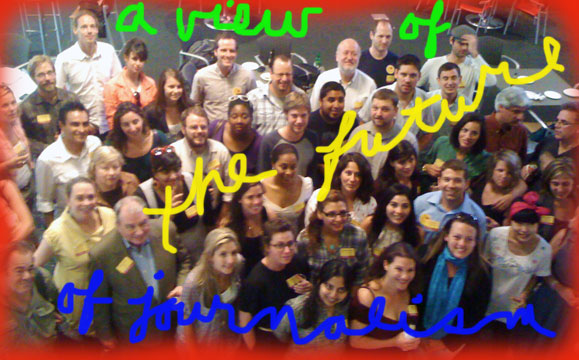
Tuesday morning I attended the presentations of projects by the brand new class of 21 candidates for master’s degrees in Specialized Journalism at USC-Annenberg.
Unlike the 2-year master’s program (where I taught last year), the SJ grad program is compressed into an intensive 9-month period. The students accepted are by-and-large working journalists who have decided to go back to school for specialization and/or to generally crank it up a notch or five. (To give you an idea, one of the new SJ candidates is Rebecca Schoenkopf, who was the editor-in-chief of at Los Angeles CityBeat and, before that, she wrote the popular Commie Girl column for the OC Weekly.)
In August, before the school term begins, the SJ students participate in a two-week “multimedia boot camp” to jump start the program —at the end of which they are required to research report and produce a four-minute multimedia story on a specific topic.
For this final boot camp project, they were divided up into 7 teams of three and each team was given a content adviser/assignment editor.
I was one such adviser.
Many of the students came to Annenberg from out of state–and in several cases—from out of the U.S. Thus most had little on-the-ground knowledge of Los Angeles.
Yet they plunged with enthusiasm into topics that included Skid Row, LA gangs, Farmlab, the canceled elections in the city of Alhambra, the new LA literary magazine “Slake,” issues surrounding the show “So You Think You Can Dance,” and the gifted LA architect, Alice Kimm—who designed, among other buildings, the LAPDs new fabric-draped parking structure.
Tuesday all 21 presented their finished stories.
(I’m sure you can’t possibly guess which topic I oversaw. Hint: it was not “So You Think You Can Dance”—although those three final projects were inventive and loads of fun to watch.)
Over the next few days, I’ll be posting some of the projects here. So stay tuned.
PS: One of the joys of university teaching is that it is simply impossible to teach and remain pessimistic about the future. While some of my non-teaching colleagues grow increasingly—and understandably—saddened by the belief that journalism is going to hell in a handbasket, I feel stupendously lucky because I get to spend time around the generation who will freshly reinvent journalism for the rest of us.
And that’s a good thing.

Celeste. I would be very interested to know why some of your colleagues think that journalism is going to hell in a handbasket. When you have time. Sounds like you’re busy with students right now.
Clark, part of it is simply the cut backs in newsrooms. But also there’s still something of the perception that the blogosphere is ruining so-called real journalism, that everyone is turning into non-readers with the attention span of gnats who don’t care about anything but TMZ. However, the reality is something quite different. It’s challenging, and assuredly offers little in the way of job security. But real change is like that.
Anyway, that’s a short answer for a good question that likely deserves better.
Celeste, Your explanation was long enough for me to get the gist of it. Thank You. I’m interested in how our country is transforming and I want to see it from as many angles as possible, including the transforms of your profession. I should say when I was in Army boot camp in the 60’s with the threat of possibly going to Vietnam I went from being a complete indifferent to an avid reader of domestic and world politics overnight. The collective fear hovering around us now is only getting worse. I believe journalism is going to have a major role in our transformation. CE